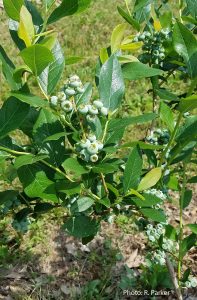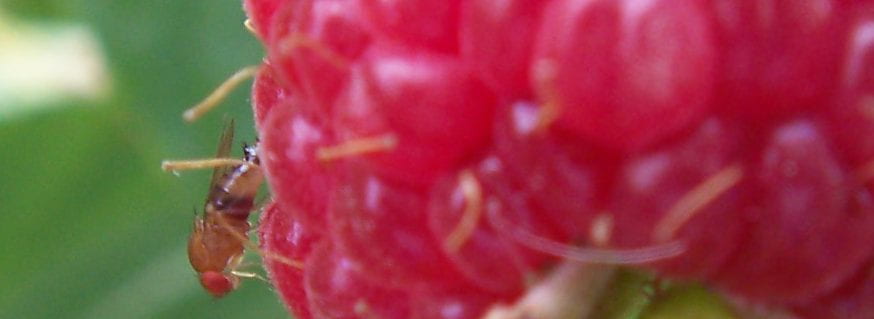One female SWD was caught in a trap set in the hedgerow by a blueberry and raspberry planting in Wyoming County, also near a strawberry field. These traps, checked on June 26, 2019, are being monitored by Donald Gasiewicz, Cornell Cooperative Extension Association of Wyoming County.

Diversified fruit farms — Prepare yourselves for SWD! If you’re growing susceptible fruit - sweet cherries, tart cherries, raspberries, blackberries, elderberries, blueberries, June strawberries, day-neutral strawberries, thin-skinned grapes, peaches, nectarines, plums, prunes. If you have a diversified fruit farm, consider that SWD will spill over into other fruit, for example, when you renovate your strawberry planting, or when you stop harvesting a crop and leave the cull fruit in the field.
Fruit becomes susceptible to SWD oviposition when it is ripening and is highly susceptible when it is ripe — raspberry, blackberry, blueberry, sweet cherry, tart cherry, elderberry. Fruit that is less susceptible will be attacked when it is at peak ripeness — peach, nectarine, plum, prune, strawberry. All fruit can serve as a resource for feeding and breeding when it is left for cull in the field. The good news is that, in degraded fruit, SWD doesn't compete all that well with other fruit flies, like Drosophila melanogaster, our common fruit fly, which often shows up in our kitchens in late summer or in the winery during press. SWD prefers nice ripe fruit — like we do!
Comprehensive information on SWD IPM is available in the IPM Guides from the NE IPM Center SWD Working Group:
Spotted Wing Drosophila IPM in Blueberries
neipmc.org/go/swdpub2
Spotted Wing Drosophila IPM in Raspberries & Blackberries
neipmc.org/go/swdpub1
Consult Cornell Fruit Resources SWD Management, fruit.cornell.edu/spottedwing/management/. Refer to the Cornell Guidelines, cropandpestguides.cce.cornell.edu/. Commercial fruit growers should have the 2019 versions of the Berry Crops, Tree Fruit, or Grape Guidelines.

